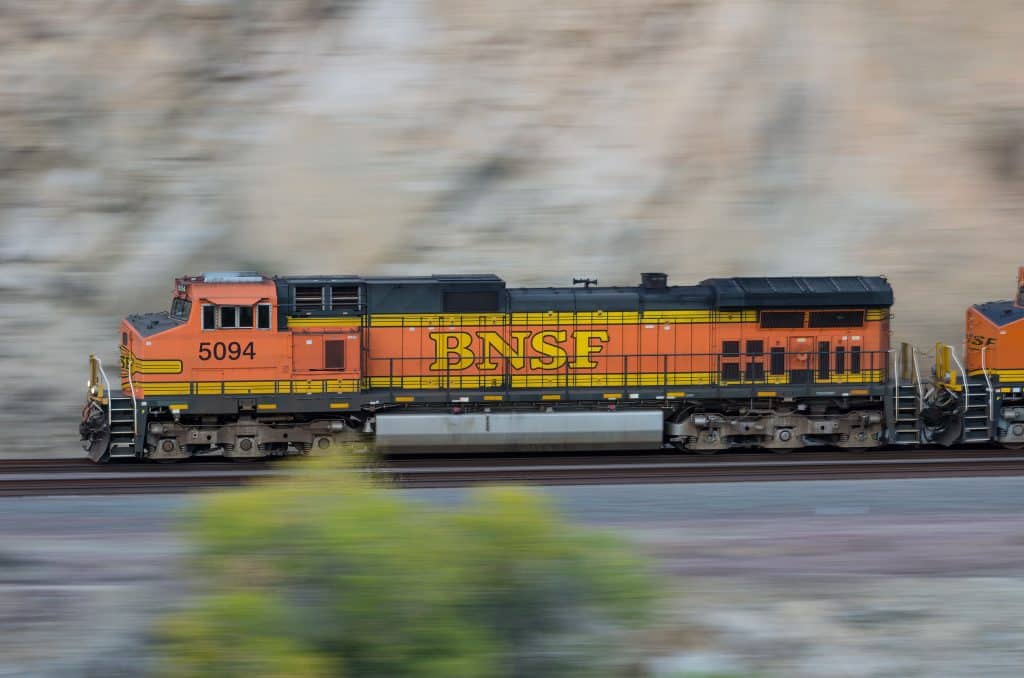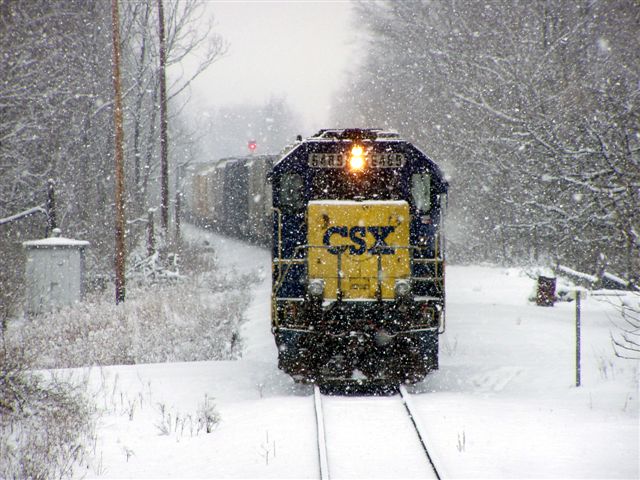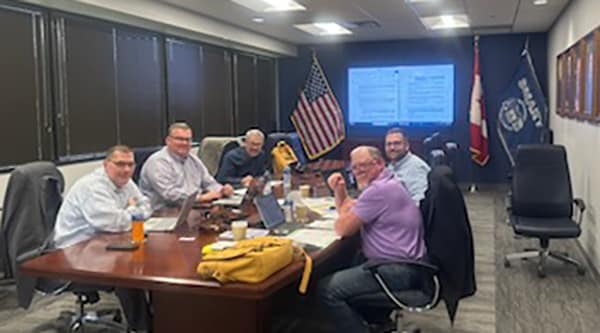Brothers and Sisters,
I would like to take a moment to address the tentative agreements on certain properties, including CSXT, NS, and BNSF, which are currently out for ratification or will be shortly, which for most will be in lieu of the traditional “national agreement.” Undoubtedly, this scenario is a bit unusual to those of us who have been around for a decade or more, and it is even more unconventional to us as international officers who are usually engaged in national negotiations every three to five years. We are definitely in some uncharted waters here, because we have never seen a tentative agreement come to fruition before our Section 6 notices were even served, or the existing agreement’s moratorium has opened to require negotiations under the Railway Labor Act (RLA).
In the last round of negotiations, we were met with some of the most-contentious circumstances imaginable, due to all the carriers being hell bent on achieving crew consist changes to remove conductors from our through freight trains. Throughout that round of bargaining, not a single rail labor union was able to gain any meaningful traction, as the carriers made it very clear they were not negotiating with anyone until SMART-TD conceded to eliminating a significant portion of the conductor craft. Of course, we never agreed and instead made our case to Presidential Emergency Board 250, which reaffirmed that all crew consist issues were to be handled at the “local level” (i.e., the General Committee of Adjustment level). PEB 250 also gave us the largest pay increase in modern history, along with some very complex work rule changes to include rest days, and the reinstatement of the 15 percent monthly health & welfare contribution requirement.
With the above in mind, and given some of the inquiries we have received at both the national and general committee levels, I am publishing this informational notice for members who may still be curious about certain aspects of these tentative agreements. We hope you will find the following questions and answers helpful and informative.
“Why didn’t we get more than 17.5% general wage increase? It’s not as much as 22%!”
First and foremost, the proposed general wage increases work out to be within $2.00 per day compared to what we received under PEB 250. You heard that correctly, less than $2.00 per day difference. Even though 17.5% is objectively less than 22%, we are compounding upon a higher dollar value today than we were under PEB 250. By July 1, 2029, the base foreman rate of pay will increase by $61.40 per day and the base conductor rate of pay will increase by $55.28 per day. Under the record 22% of PEB 250, our foremen experienced a $63.36 per day increase, and our conductors experienced a $56.53 per day increase. I would also like to add that this proposal is the largest general wage increase negotiated voluntarily without third party intervention, without healthcare cost increases, and without work rule changes!
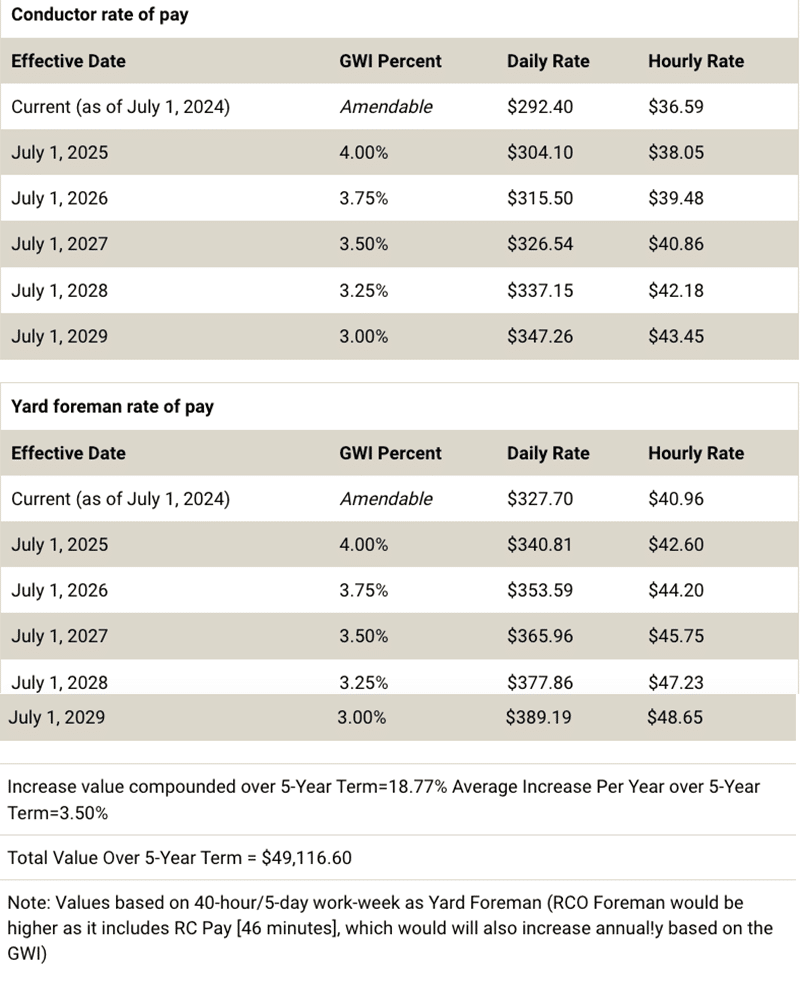
What are we giving up?
NOTHING! There are no work rule changes or healthcare cost increases included in this proposal.
What about our crew consist agreement(s) that mandate conductors on all trains?
Since there are no work rule changes affecting crew consist, these agreements (if ratified) will secure another five-year period where no changes can even be proposed under Section 6 of the RLA. This is huge! Yes, we have obtained a two-person crew regulation from the Federal Railroad Administration, but we are still very concerned about the possibility of future anti-labor and anti-regulation focused administrations undermining our progress. We are equally concerned with what the Supreme Court has done with their recent Chevron decision, which could also compromise our regulation. Ratifying these agreements now will protect and guarantee the future of our conductors, while providing another 5 years for us to focus on passing a rail safety bill through Congress, which would make two-person crews the literal law of the land.
What else is in this for me?
If you have fewer than 25 years of service, you will be getting your next week(s) of vacation entitlement two years sooner. You will see much needed and commonly requested increases to your dental, orthodontic, and vision benefits, and voluntary male sterilization (vasectomies) will be covered by your medical insurance. Additionally, if you are single, you will have the option to choose a health & welfare plan with a lower monthly contribution requirement of 10%, compared to the 15% we are all currently paying. This voluntary option is worth approximately $100 per month for those who qualify and decide to opt in. For those who opt completely out of coverage, the payment made to you will double, from $100 to $200 per month.
Why are General Chairmen signatory to this agreement and not the SMART-TD International officers?
Leading up to this tentative agreement, there were some informal discussions at the “national” level between some of the involved rail labor unions and the National Carriers Conference Committee (NCCC), which is the umbrella organization that represents approximately 40 railroads who are party to national bargaining.
Disappointingly, but not surprisingly, those discussions were not productive. However, one particular railroad CEO, Joe Hinrichs from CSX, took the bull by the horns and said he would make a deal for most of what had been discussed but rejected by the NCCC. As a result, these agreements now have to be done “on the property” at the individual General Committee level. Interestingly, NS and BNSF management also agreed to the same deals shortly after the CSX. Why? It’s a proposal that should bring labor peace instead of the high-profile confrontations all their shareholders witnessed just a few years ago. Simple as that. No hidden agendas, no waiting for 2+ years, no backpay hanging in the balance, and no nonsense.
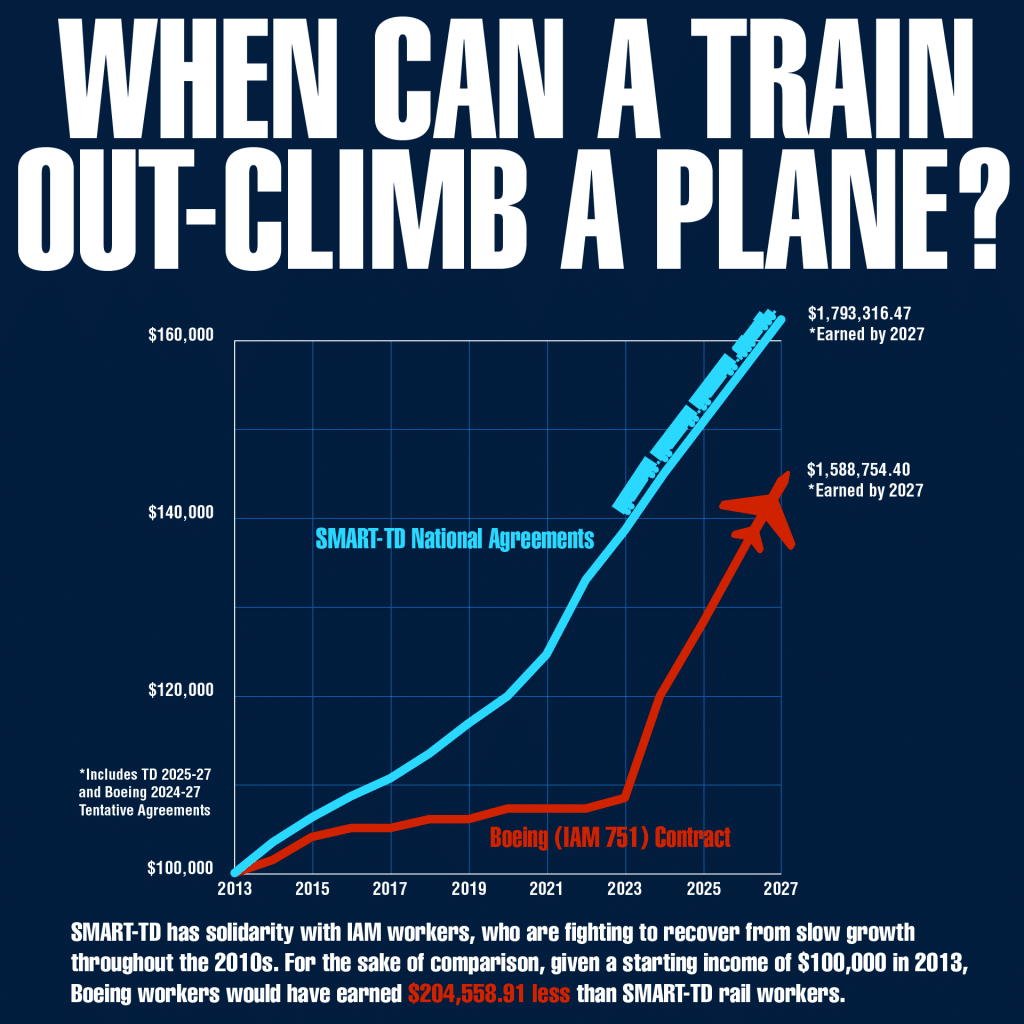
Boeing looks like they are getting a 30% pay increase and we should too!
We can certainly all agree that we should always get the highest general wage increases possible, and that is absolutely what we fight for. Fortunately for us, our situation is not comparable to Boeing employees being represented by the IAM. Going back to at least 2014, those Boeing employees have received sub-standard wage increases that have consistently fallen short of our agreements. If they ratify their proposed wage increases, it will essentially bring them up to speed with where SMART-TD members are today. And that is before we factor in the 17.5% general wage increases that have been proposed to you right now. Further, the Boeing proposal does not include back pay, so those employees will never recoup what they have lost during negotiations, which weakens the dollar value of what they are getting compared to what we have enjoyed during that time. Another major nuance when comparing the two is that Boeing employees lost their pension if they had fewer than 20 years of service, which is valued at approximately $5 per hour. By comparison, our pension fund is secured and doing very well at the RRB. Just like the John Deere, UPS, and UAW scenarios we have observed over the past few years, Boeing simply does not compare to us. We cannot fixate on the percentages of another union’s general wage increases without considering their agreements as a whole. Doing so would be a disservice to our members and a failure in our duties to obtain the best possible wages, rules, and healthcare improvements. Nonetheless, social media, anti-labor news outlets, and bad-faith actors who want us to fail continue to attempt to mislead our members with half-truths and misleading statistics.
These tentative agreements are simple and straightforward, and provide substantial wage increases without making concessions in other areas, and without making us fight for 2-3 years just to get what we deserve. Like every agreement in every unionized setting, this may not address or resolve every single issue that is important to every single member, but I am proud to say that this agreement provides significant improvements on many of the key issues that our members tell us about. Of course, we could have demanded everything and refused to meet on middle ground, which would have inevitably led to the same old drawn-out battle and years of delays, likely followed by a binding decision made by outsiders who do not completely understand our industry. We saw that play out in PEB 250, and our members have made it abundantly clear that they do not want a repeat of that situation. We firmly believe that this is a straightforward, no B.S. agreement that delivers another round of damn good wage increases and healthcare improvements, without sacrificing other important areas such as our work rules, crew consist, and benefits.
If you still have questions, I highly encourage you to contact your General Chairperson or this office prior to casting your vote. We are more than willing and able to dispel any rumor or misinformation that is circulating on social media, in the crew room or on anti-union so-called “news” outlets. To find contact information for your General Committee office, the simplest way is to download the SMART Union app on your phone or tablet, or visit our website at www.smart-union.org to register and sign in to the Member Portal. From there, you can find a convenient directory with all the contact information for your elected representatives.
I hope this provides a better understanding of what is on the table — and perhaps most importantly what we don’t have on the table — for you to decide on. When all things are considered, we are confident that a “yes” vote is the right decision for our involved members, and we highly recommend that you do so.
In solidarity,
Jeremy R. Ferguson

